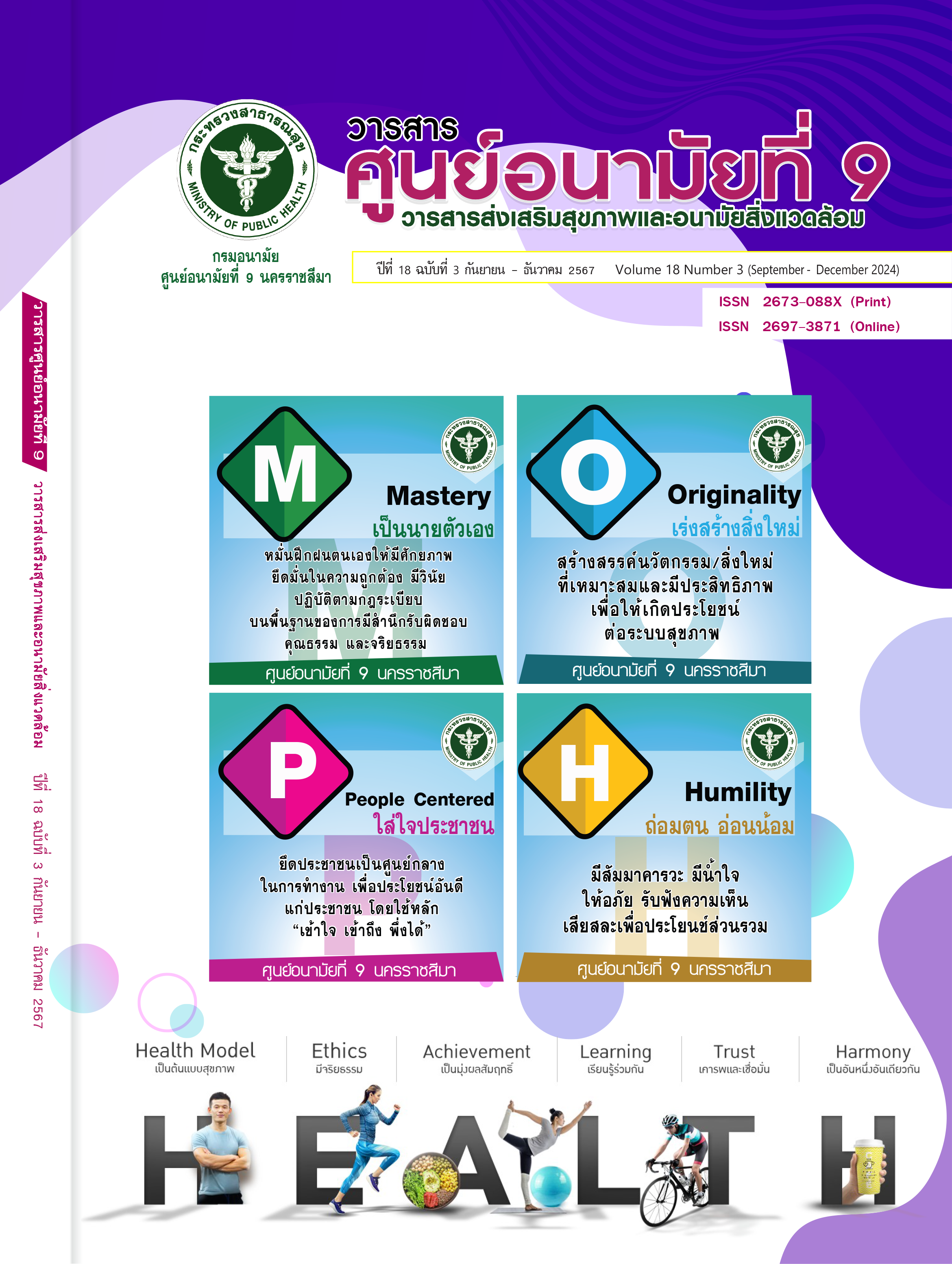ผลของสมุดเบาหวานในการควบคุมโรคเบาหวาน และการเพิ่มความรอบรู้ด้านสุขภาพ ในผู้ป่วยที่มีการควบคุมโรคเบาหวานได้ไม่ดี
คำสำคัญ:
โรคเบาหวาน, สมุดเบาหวาน, ความรอบรู้ด้านสุขภาพ, การควบคุมโรคเบาหวานได้ไม่ดีบทคัดย่อ
ผู้ป่วยที่ไม่สามารถควบคุมเบาหวานได้ดี มีความรู้เกี่ยวกับโรคที่ตัวเองเป็นน้อย ขาดความเข้าใจต่ออันตรายจากการควบคุมเบาหวานได้ไม่ดี ไม่ทราบเป้าหมายในการควบคุมเบาหวาน โดยเบาหวานจำเป็นต้องควบคุมร่วมกัน ทั้งการรับประทานยา ปรับเปลี่ยนพฤติกรรม การจัดทำสมุดสุขภาพเบาหวานโดยมีการให้ความรู้และข้อมูลที่เหมาะสม และเป็นเครื่องมือที่แพทย์ใช้แนะนำผู้ป่วยและผู้ป่วยทบทวนได้
การวิจัยเชิงทดลองแบบกลุ่มเดียวนี้ มีวัตถุประสงค์เพื่อศึกษาความแตกต่างของค่าเฉลี่ยของ HbA1c และ ระดับความรอบรู้ด้านสุขภาพเรื่องโรคเบาหวาน ก่อนและหลังจากการได้รับสมุดสุขภาพเบาหวาน กลุ่มตัวอย่างคือผู้ป่วยโรคเบาหวานที่ควบคุมไม่ได้ จำนวน 37 คน โดยผู้เข้าร่วมการวิจัยจะได้รับสมุดเบาหวานประจำตัวในการติดตามรักษาโรค ในสมุดมีเนื้อหาโรคเบาหวาน ภาวะแทรกซ้อน การดูแลตนเอง ควบคุมอาหาร และเป้าหมายในการรักษา กลุ่มตัวอย่างทำแบบทดสอบวัดความรอบรู้ด้านสุขภาพ เรื่องโรคเบาหวาน และเจาะเลือดตรวจระดับน้ำตาลในเลือด (Fasting blood sugar-FBS) และระดับน้ำตาลสะสมในเลือดเฉลี่ย (HbA1c) ก่อนและหลังดำเนินการวิจัย 3 เดือน วิเคราะห์ข้อมูลส่วนบุคคลด้วยสถิติเชิงพรรณนา และวิเคราะห์ความแตกต่างทางสถิติเชิงอนุมานด้วย Paired-sample t-test
ผลการศึกษาพบว่า กลุ่มตัวอย่างมีระดับน้ำตาลสะสมในเลือด (HbA1c) เฉลี่ย ลดลงอย่างมีนัยสำคัญทางสถิติ จาก 8.64% (SD=1.58) เป็น 8.07% (SD=1.88) (p-value=0.0061) และคะแนนเฉลี่ยระดับความรอบรู้ด้านสุขภาพเรื่องโรคเบาหวานเพิ่มขึ้นอย่างมีนัยสำคัญทางสถิติ จาก 177.26 คะแนน (SD=14.87) เป็น 188.07 คะแนน (SD=11.18) (p-value=0.0003)
สมุดเบาหวานสามารถเพิ่มความรู้และช่วยทำให้ควบคุมระดับน้ำตาลในเลือดได้ การจัดทำสมุดเบาหวานร่วมใช้ในการดูแลผู้ป่วยโรคเบาหวานที่ควบคุมไม่ได้ จะช่วยทำให้ผู้ป่วยสามารถควบคุมระดับน้ำตาลในเลือดได้ดีขึ้น
เอกสารอ้างอิง
Shaw JE, Sicree RA, Zimmet PZ. Global estimates of the prevalence of diabetes for 2010 and 2030. Diabetes Res Clin Pract. 2010 Jan;87(1):4-14. doi: 10.1016/j.diabres.2009.10.007.
Chan JC, Malik V, Jia W, Kadowaki T, Yajnik CS, Yoon KH, Hu FB. Diabetes in Asia: epidemiology, risk factors, and pathophysiology. JAMA. 2009 May 27;301(20):2129-40. doi: 10.1001/jama.2009.726.
Porapakkham Y, Rao C, Pattaraarchachai J, Polprasert W, Vos T, Adair T, Lopez AD. Estimated causes of death in Thailand, 2005: implications for health policy. Popul Health Metr. 2010 May 18;8:14. doi: 10.1186/1478-7954-8-14.
Aekplakorn W, Chariyalertsak S, Kessomboon P, Sangthong R, Inthawong R, Putwatana P, Taneepanichskul S; Thai National Health Examination Survey IV Study Group. Prevalence and management of diabetes and metabolic risk factors in Thai adults: the Thai National Health Examination Survey IV, 2009. Diabetes Care. 2011 Sep;34(9):1980-5. doi: 10.2337/dc11-0099.
Lauboongua P, Aromchuen N, Bosittipichet T. Factor Associated with Health Literacy in Type 2 Diabetic Patients. Journal of Preventive Medicine Association of Thailand. 2021;11(1):173-87.
Papatheodorou K, Banach M, Bekiari E, Rizzo M, Edmonds M. Complications of Diabetes 2017. J Diabetes Res. 2018 Mar 11;2018:3086167. doi: 10.1155/2018/3086167.
Van Scoyoc EE, DeWalt DA. Interventions to improve diabetes outcomes for people with low literacy and numeracy: A systematic literature review. Diabetes Spectr. 2010;23(4):228-37.
Eknithiset R, Somrongthong R. Effectiveness of a diabetes mellitus pictorial diary handbook program for middle-aged and elderly type 2 diabetes mellitus patients: a quasi-experimental study at Taladnoi Primary Care Unit, Saraburi, Thailand. J Multidiscip Healthc. 2017 Aug 21;10:327-334. doi: 10.2147/JMDH.S138815.
Wattanapisit A, Thanamee S, Wongsiri S. Physical activity counselling among GPs: a qualitative study from Thailand. BMC Fam Pract. 2019 May 29;20(1):72. doi: 10.1186/s12875-019-0968-x.
Health Education Division, the Ministry of Public Health, Thailand. The development of Health literacy for Diabetes Mellitus and Hypertension Patients [Internet]. Available from: http://www.hed.go.th/news/5522
Parnnark P, Moonsart S, Kaewphrom C. The Effectiveness of a Program for Health Literacy Development of the Patients with Uncontrolled Type 2 Diabetes at Bangwua District, Chachoengsao Province. Nursing Journal of The Ministry of Public Health. 2017;27(3):91-106.
Seangpraw K, Ong-Artborirak P, Boonyathee S, Bootsikeaw S, Kantow S, Panta P, Winaiprasert P. Effect of Health Literacy Intervention on Glycemic Control and Renal Function Among Thai Older Adults at Risk of Type 2 Diabetes Mellitus. Clin Interv Aging. 2023 Sep 7;18:1465-1476. doi: 10.2147/CIA.S413456.
Pragosuntung N, Hongsranagon P, Khochanam S, Udomprasertkul V. Factors associated with glycemic control in type 2 diabetes patients at primary care units, Pathumrat District, Roi-Et province, Thailand. Journal of Health Research. 2011;25(4):195-8.
ดาวน์โหลด
เผยแพร่แล้ว
รูปแบบการอ้างอิง
ฉบับ
ประเภทบทความ
สัญญาอนุญาต
ลิขสิทธิ์ (c) 2024 วารสารศูนย์อนามัยที่ 9 : วารสารส่งเสริมสุขภาพและอนามัยสิ่งแวดล้อม

อนุญาตภายใต้เงื่อนไข Creative Commons Attribution-NonCommercial-NoDerivatives 4.0 International License.
บทความหรือข้อคิดเห็นใด ๆ ที่ประกฎในวารสารศูนย์อนามัยที่ 9 เป็นความคิดเห็นของผู้เขียน บรรณาธิการ คณะผู้จัดทำ และศูนย์อนามัยที่ 9 นครราชสีมา (เจ้าของ) ไม่จำเป็นต้องเห็นด้วย ผู้เขียนต้องรับผิดชอบต่อบทความของตนเอง
ผลการพิจารณาของกองบรรณาธิการและผู้ทรงคุณวุฒิถือเป็นที่สิ้นสุด คณะบรรณาธิการวารสารฯ ขอสงวนสิทธิ์ในการตรวจแก้ไขข้อความให้ถูกต้องตามหลักภาษาและมีความเหมาะสม
กองบรรณาธิการวารสารฯ ขอสงวนสิทธิ์มิให้นำเนื้อหาใด ๆ ของบทความ หรือข้อคิดเห็นใด ๆ ของผลการประเมินบทความในวารสารฯ ไปเผยแพร่ก่อนได้รับอนุญาตจากกองบรรณาธิการ อย่างเป็นลายลักษณ์อักษร และผลงานที่ได้รับการตีพิมพ์ถือเป็นลิขสิทธิ์ของวารสารศูนย์อนามัยที่ 9


